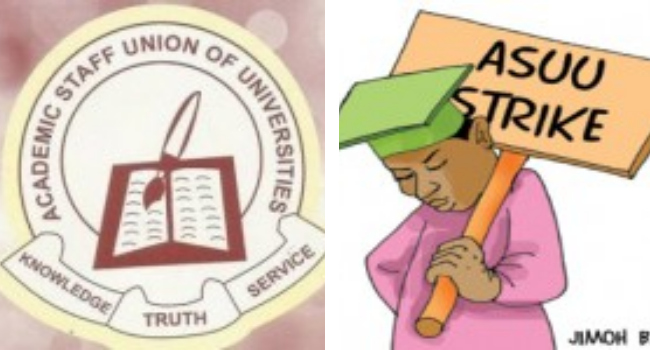News
Blame FG if we go on strike – ASUU

By Francesca Hangeior
The Academic Staff Union of Universities, Nsukka Zone, has raised concerns over the Federal Government’s failure to address the issues that have plagued the nation’s university system, warning that another strike may be imminent if the situation persists.
Zonal Coordinator of ASUU Nsukka Zone, Raphael Amokaha, made this known in a statement issued in Makurdi on Wednesday.
According to him, the Union’s decision to hold off on industrial action since the suspension of the 2022 strike was a display of patriotism and selflessness.
However, the Federal Government’s continuous neglect of the education sector is now pushing ASUU towards considering another strike.
“The Union has bent backwards to avoid industrial disharmony in our public universities by seeking an amicable resolution of the issues in contention,” Amokaha said.
Reflecting on the circumstances that led to the 2022 strike, Amokaha recounted how the Union had been left with no choice after the government brushed aside a negotiated agreement and instead imposed a “take it or leave it” offer.
He added that despite years of negotiations, little progress has been made in addressing the core issues affecting Nigerian universities.
“We were forced into the 2022 strike by the government. What option was available to our union at that time? We had negotiated a reviewed agreement over five years (2017-2022) under three government-appointed negotiation chairmen, yet the government dismissed it and offered a unilateral award,” he explained.
The ASUU zonal coordinator also lamented the continued deterioration of the nation’s universities, stating that nothing has changed for the institutions or their staff in the past fifteen years.
“All efforts by our Union to halt the decay and revitalize our universities have been frustrated by the government. Efforts to improve the welfare of our members have equally been blocked,” he added.
Amokaha highlighted that university workers remain the only group of employees in Nigeria that have not had a salary review in over fifteen years.
“We have consistently held press conferences, staged protests, and organized town hall meetings to avoid strikes and impress upon the government the need to act. Unfortunately, all these efforts have been futile,” he lamented.
He warned that unless the Federal Government is sincere in its discussions with ASUU and takes immediate steps to resolve the lingering issues, the Union may have no option but to embark on another strike.
Among the key demands, according to Amokaha, are the conclusion of the renegotiation of the 2009 FGN/ASUU Agreement, based on the Nimi Briggs Committee’s Draft, the release of withheld salaries due to the 2022 strike action, and the payment of unpaid salaries for staff on sabbatical, part-time, and adjunct appointments affected by the Integrated Payroll and Personnel Information System.
Other demands include the release of outstanding third-party deductions such as check-off dues and cooperative contributions, funding for the revitalization of public universities as captured in the 2023 Federal Government Budget, payment of Earned Academic Allowances, and addressing the proliferation of universities by Federal and State Governments.
“The ball is now in the government’s court. If we go on strike, the blame lies squarely with the Federal Government,” Amokaha concluded.
News
JAMB Postpones 2025 UTME Registration to February 3

By Kayode Sanni-Arewa
The Joint Admissions and Matriculation Board (JAMB) has announced a shift in the commencement date for the 2025 Unified Tertiary Matriculation Examination (UTME) registration. Initially scheduled to begin on Friday, January 31, 2025, the registration will now start on Monday, February 3, 2025.
According to JAMB, the adjustment is necessary to implement crucial changes to its registration templates. The modifications follow the recent suspension of certain law programs in selected universities, as communicated to the Board by the Council for Legal Education.
A statement issued by JAMB’s Public Communication Advisor, Fabian Benjamin, also revealed that the Board discovered that some Computer-Based Test (CBT) centers had secured approval through fraudulent means. This development has necessitated further scrutiny and the disqualification of such centers to ensure the integrity of the examination process.
“The Board acknowledges the disruption this may cause to candidates and other stakeholders and sincerely apologizes for any inconvenience,” Benjamin stated.
He assured that the additional time would be used to implement all necessary adjustments to facilitate a seamless registration process.
News
Anambra monarch fingered In Community’s Insecurity Scandal

By Kayode Sanni-Arewa
There is looming tension in Enugwu-Agidi community over the arrest of a suspected kidnapper Chukwudi Tansi by Soludo’s Agunechemba team .
Recently , the Social media was awash with news about the arrest of Chukwudi Tansi, a member of the Enugwu-Agidi Community Vigilante, apprehended with a cache of firearms, which exposed his alleged involvement in criminal activities that have long plagued Enugwu-Agidi community.
What adds more fuel to the fire is the implication of the traditional ruler of the community in the unfolding drama, as revealed by the President General (PG) of the community, Hon Chukwuebuka Onuorah
Speaking to journalists, the PG, Mr. Onuorah, expressed vindication . He pointed fingers at the traditional ruler for nominating Tansi to the community Vigilante despite prior warnings from the PG about Tansi’s possession of firearms.
Speaking further, Onuorah said he went as far as writing to the Inspector General of Police, citing threats to his life and the illegal possession of weapons by Tansi, a willing tool in the hand of the traditional ruler.
Part of his letter to the Inspector-General of Police reads:
“After my inauguration, I have received series of threats from the Traditional Ruler of Enugwu-Agidi HRH Mike Okekeuche of Umuakwuelo-Etiti village, Enugwu-Agidi in Njikoka LGA of Anambra State, Nigeria, ranging from forceful invasion of my residence and privacy and restriction of my free movement.
On Friday, 29th March, 2024 at exactly 11:07am, my residence was surrounded and invaded by heavily armed unknown faces who later introduced themselves as members of the Nigeria Police Force, claimed to be acting on the instructions of HRH Mike Okekeuche, took me to an unknown destination, but I return glory to God, that the unknown gun men vehemently warned me to denounce my position as the President General of Enugwu-Agidi Brotherly Union Nigeria (EBU-NIG) so that Igwe’s choice will be installed and later released me unhurt.
“The Igwe HRH Mike Okekeuche, through one Chukwudi Tansi and Okonkwo Clement Ugochukwu, well-known members of outlawed IPOB, who parade themselves as soldiers and moving around the community with AK47 rifles have on several occasions attacked me with their guns, threatening to kill me, except I resign and step down from my position as the President General of my Community, and Igwe’s choice installed, that even the local Police are afraid of them. The confidence reposed on me by the good people of Enugwu-Agidi, I do not wish to give away; hence I had to run away for my dear life.
“Sir, in this circumstance, I am writing this petition with hope of consolation vis-a-vis calling attention of Police IRT, Abuja whose track record in tackling heinous crimes is visible to the blind and audible to the deaf in Nigeria, to arrest, and prosecute the above named unscrupulous criminal elements and all that are involved no matter whose ox is gored. Peradventure my complaints get to you late, and my life taken away, you should at least know my killer for I do not wish to join the long list of unresolved murders”.
Corroborating the PG’s account, a social media user from Enugwu-Agidi, Ezeobi, raised pertinent questions about influential figures aiding Tansi’s evasion of justice despite his involvement in serious criminal activities.
In light of these revelations, the PG is now urging for a thorough police investigation to expose the support network shielding individuals like Chukwudi Tansi.
News
Nigeria Needs Thinkers and Builders, Not Spectators – Speaker Abbas

…highlights youth as key to progress
By Gloria Ikibah
Speaker House of Representatives,Rep. Tajudeen Abbas, has emphasised the need for Nigeria to have active thinkers, builders, and leaders rather than passive observers.
Giving a Convocation Lecture at the Federal University of Technology, Minna (FUT Minna), Speaker Abbas described Nigerian youths as the country’s most valuable assets, urging them to embrace innovation and technology to drive national development.
His lecture, titled “From Crisis to Prosperity: Harnessing Technology to Drive Nigeria’s Transformation,” focused on the role of technology in shaping the country’s future.
-

 Entertainment24 hours ago
Entertainment24 hours agoSad! P3rn star falls to death after recordings threesome
-

 Economy11 hours ago
Economy11 hours agoNaira rebounces again, gains 1.6% against Dollar at official market
-

 Opinion11 hours ago
Opinion11 hours agoNCC’s 50% Telecom Tariff Hike: A Necessary Step for Industry Survival or a Burden on Nigerians?
-

 News16 hours ago
News16 hours agoTop 10 African countries who received most U.S. HIV/AIDS Assistance in 2024
-

 News23 hours ago
News23 hours agoTop 10 safest cities in the world
-

 News17 hours ago
News17 hours agoNYSC reveals when members will start earning N77k monthly
-

 Sports16 hours ago
Sports16 hours agoAFCON 2025: Tanzania ready to face Super Eagles, others — Ali David
-

 News24 hours ago
News24 hours agoAlleged Cybercrime: How Abuja Court Insisted On Sowore’s Passport Despite Police Bail Argument Flaws








